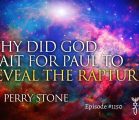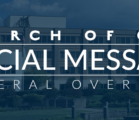Preventing the Anglican Revolt in the Church of God: The Obvious Rationale Behind Agenda Item #18
Behind Agenda Item #18
As I mentioned earlier, the Church of God will convene its General Assembly next week in Orlando. The agenda is out and posted.
Most church meeting agendas like this are full of arcane items that may be very weighty to those whom they directly impact but of little relevance to everyone else, even for general interest. However, most agendas have at least one item that breaks that mould. This go around we have Agenda Item #18, which means it will be taken up at the bottom of both General Council and General Assembly (for my Anglican and other visitors, going into the details about how that works is a long business which I’ll skip).
The agenda item reads as follows:
10. Responsible Use of Social Media
Christians are exhorted by Scripture to speak the truth in love (Ephesians 4:15), to provide things honest in the sight of all persons (Romans 12:17), and to do all things for the edification of others (Romans 15:2). The use of social media (such as MySpace, Facebook, Twitter, blogs, websites, and so forth) by believers should conform to these and other biblical standards.
Church of God ministers, as examples of believers in speech, life, faith, and purity (1 Timothy 4:12), shall at all times agree:
a. To write and post only under their own name.
b. To not attack fellow ministers or members of the Church of God. One may disagree with others, provided the tone is respectful and does not become a personal attack.
c. To not disclose any sensitive, confidential, or financial information about the church, its ministers, or its members, other than what is publicly available.
d. To not post any material that is defamatory, libellous, threatening, harassing, abusive, or embarrassing to any person or entity.
e. To uphold the doctrine of the Church of God by not writing or posting anything contrary to the accepted doctrine of the Church of God.
Failure to follow these guidelines on the use of social media shall result in the offending minister being subject to discipline for unbecoming ministerial conduct.
Advertisement
Let me first make a couple of purely personal observations.
This doesn’t apply to me because I am not ministerially credentialled in the Church of God or anywhere else. One of these days my church may get its canful of the “Elitist Snob” bloviating the way he does and turn me out, but that’s not what’s being discussed here.
Although people often have trouble figuring out who is behind this blog, I’ve never gone “anonymous” in what I have to say on the Internet. That’s not because I object to the concept of anonymous presence on the net; there are situations where it is necessary for a variety of reasons. While going that route wasn’t my choice, I can see why others might justifiably do so. (That’s my response to (a)).
With that out of the way, let me put forth why I think this should not be adopted.
I’ve had the experience of working in two church “blogospheres” over the last decade or so: the Anglican/Episcopal one first, and then my church’s own, especially during the “Missional Revolt” in 2008-10. I’ve always contended that the Anglican/Episcopal drama is the most riveting story in contemporary Christianity, and one thing that made it that way was the demonstration of the power of the Internet via websites, blogs and social media.
The Episcopal Church has had a long-term leftward drift punctuated by severe lurches in that direction. In the 1960’s and 1970’s we ended up with the 1979 BCP and the general dilution of orthodox Christian belief. What resulted was a severe bleeding of the membership and scattered Anglo-Catholic secession, but the church’s control of the situation remained intact, setting us up for the next lurch: the elevation of V.G. Robinson to the status of bishop.
This go around was different. Using the Internet, and with the help of the African provinces, Anglicans were able to spread the word that there was an alternative out there to revisionist church. Although the ACNA and the other Anglican bodies that have come up have their issues, that they exist at all in the strength they have–including old Episcopal congregations and dioceses, with or without the property–is a testament to the power of the Internet and the persistent voices that encamped there.
The Church of God’s situation was entirely different in terms of doctrine and the nature of the dispute, but one result was the same: a direct and effective challenge to the leadership of the church. Without the blogs and websites of those who sought changes in the financial–and by extension the general–direction of the church, the changes that were mandated in 2008 and subsequently implemented would have never taken place.
Whether this is a net benefit or deficit is something that only time will tell. There’s no doubt, however, that our leadership would like to prevent a repeat of that. Much of what’s in the item (especially b-d) sounds very nice. But why should this be spelled out only for online speech when much of it has more general application for Christians? In that respect the agenda item is superfluous.
One of these days the ministers and lay people of our church are going to have to “go to the mat” over more than just where the money goes. In many ways this item is like the Anglican Covenant: it looks great up front, but in the future could be used as a club by revisionists who get control of the apparatus.
I trust that our ordained bishops will see the sense in voting down this item and not force the laity to do it for them.
Note on item (e): That’s another item that many of my Anglican friends probably would take heart in. But many Church of God ministers–even conservative ones–are very leery at enacting explicit “doctrinal tests” like this. Their rationale is rooted in the history of modern Pentecost, but the truth is that discussions figuring out what’s orthodox and what’s not often fall to a low level, which would turn explicit adherence clauses like this into a club to be used by the minister with the biggest mouth. (It’s not that much better elsewhere, if you’re wondering). How we’re planning to handle the coming assault by the LGBT community is the question we need to be spending time on. But we’re not.

